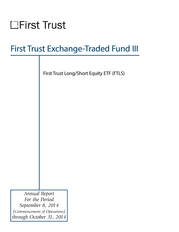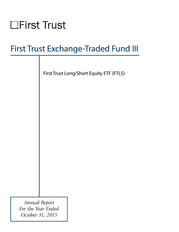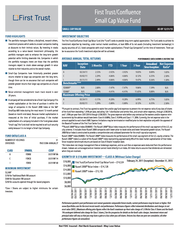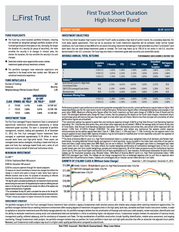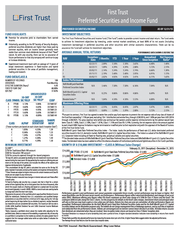Description
FIRST TRUST PREFERRED SECURITIES AND INCOME FUND
AS OF 12/31/15
INVESTMENT ADVISOR
PORTFOLIO INFORMATION
INDUSTRY BREAKDOWN
INDUSTRY TYPE
n
n
n
n
n
n
n
n
n
n
n
n
n
n
Banks
Insurance
Food Products
Capital Markets
Real Estate Investment Trusts (REITS)
Electric Utilities
Industrial Conglomerates
Diversiï¬ed Financial Services
Diversiï¬ed Telecommunication Services
Metals & Mining
Consumer Finance
Ind. Power and Renewable Elect. Producers
Wireless Telecommunication Services
Oil, Gas & Consumable Fuels
TOP TEN HOLDINGS
Liberty Mutual Group, Inc., 10.75%, 6/15/58
Aquarius + Inv. PLC for Swiss Rein.
Co., Ltd., 8.25% Farm Credit Bank of Texas, Series 1, 10.00% Land O'Lakes Capital Trust I, 7.45%, 3/15/28 General Electric Capital Corp., Series A, 4.00% Friends Life Holdings PLC, 7.88% CoBank ACB, Series F, 6.25% Bank of America Corp., Series Z, 6.50% Land O' Lakes, Inc., 8.00% Societe Generale SA, 8.00% CREDIT ANALYSIS COUNTRY BREAKDOWN PERCENT 42.36% 24.04% 6.26% 5.40% 4.52% 4.11% 3.57% 2.49% 2.46% 2.35% 0.88% 0.65% 0.52% 0.39% PERCENT 2.97% 2.78% 2.48% 2.34% 2.25% 2.22% 2.03% 1.92% 1.90% 1.86% PERCENT 3.57% AA2.78% A 4.77% A13.95% BBB+ 12.07% BBB 18.31% BBB15.99% BB+ 11.02% BB 8.58% BB3.84% B+ 0.88% B 4.24% NR Independent credit ratings agencies use a rating system to help investors determine the risk associated with an issuing company’s ability to meet its obligations (interest and principal repayment) on a loan. The ratings begin at AAA for the highest rating, with C or D being the lowest rating. The credit worthiness ratings shown above relate to the issuers of the underlying securities in the Fund, and not to the Fund or its shares. Ratings shown above are subject to change.
Industry allocation and holdings are subject to change and companies referenced in this fact sheet may not be currently held. Information is current as of the creation of this sheet. Portfolio holdings are subject to risks. The credit quality and ratings information presented reflects the ratings assigned by one or more nationally recognized statistical rating organizations (NRSROs), including Standard & Poor’s Rating Group, a division of the McGraw Hill Companies, Inc., Moody’s Investors Service, Inc. or a comparably rated NRSRO. For situations in which a security is rated by more than one NRSRO and the ratings are not equivalent, the highest rating is used.
Sub-investment grade ratings are those rated BB+/Ba1 or lower. Investment grade ratings are those rated BBB-/Baa3 or higher. See the prospectus or summary prospectus for more complete descriptions of ratings and rating organizations. Market value information used in calculating the percentages is based upon trade date plus one recording of transactions, which can differ from regulatory financial reports (Forms N-CSR and N-Q) that are based on trade date recording of security transactions. COUNTRY n n n n n n n n n United States United Kingdom France Bermuda Australia Ireland Italy Netherlands Cayman Islands PERCENT 58.44% 8.92% 7.52% 4.62% 3.59% 2.78% 2.66% 2.52% 2.06% COUNTRY n Luxembourg n Spain n Germany n Chile n n n n First Trust Advisors L.P.
is the Investment Advisor to the Fund and has been serving broker/dealers, individuals, and institutional investors from its Chicago-area headquarters since 1991. • Experienced asset manager/supervisor • Provider of innovative financial solutions • Long-term strategic investor nationally recognized for its fundamental and quantitative strategies PERCENT Belgium Switzerland Brazil Colombia Canada 1.57% 1.56% 0.70% 0.65% 0.64% 0.64% 0.52% 0.52% 0.09% INVESTMENT MANAGER Stonebridge Advisors LLC is a registered investment adviser founded in 2004. Based in Wilton, CT, Stonebridge is a niche institutional asset management firm which provides highly specialized expertise in the management of preferred securities portfolios for institutional investors and individuals. You should consider the Fund’s investment objectives, risks, and charges and expenses carefully before investing. Contact First Trust Portfolios L.P. at 1-800-621-1675 or visit www.ftportfolios.com to obtain a prospectus or summary prospectus which contains this and other information about the Fund. The prospectus or summary prospectus should be read carefully before investing. WHAT ARE THE RISKS? You could lose money by investing in the Fund.
A mutual fund’s share price and investment return will vary with market conditions, and the principal value of an investment when you sell your shares may be more or less than the original cost. CONCENTRATION RISK. A fund concentrated in a single industry or sector is likely to present more risks than a fund that is broadly diversified over several industries or sectors. Compared to the broad market, an individual industry or sector may be more strongly affected by changes in the economic climate, broad market shifts, moves in a particular dominant stock, or regulatory changes. CREDIT RISK. Credit risk is the risk that an issuer of a security may be unable or unwilling to make dividend, interest and principal payments when due and the related risk that the value of a security may decline because of concerns about the issuer’s ability or willingness to make such payments.
Credit risk may be heightened if the Fund invests in high yield or “junk” securities. Such securities, while generally offering higher yields than investment grade debt with similar maturities, involve greater risks, including the possibility of dividend or interest deferral, default or bankruptcy, and are regarded as predominantly speculative with respect to the issuer’s capacity to pay dividends or interest and repay principal. DEPOSITARY RECEIPTS RISK. Depositary receipts may be less liquid than the underlying shares in their primary trading market. Any distributions paid to the holders of depositary receipts are usually subject to a fee charged by the depositary. Holders of depositary receipts may have limited voting rights, and investment restrictions in certain countries may adversely impact the value of depositary receipts because such restrictions may limit the ability to convert the equity shares into depositary receipts and vice versa.
Such restrictions may cause the equity shares of the underlying issuer to trade at a discount or premium to the market price of the depositary receipts. FINANCIAL COMPANIES RISK. Financial companies are especially subject to the adverse effects of economic recession, currency exchange rates, government regulation, decreases in the availability of capital, volatile interest rates, portfolio concentrations in geographic markets and in commercial and residential real estate loans, and competition from new entrants in their fields of business. HIGH YIELD SECURITIES RISK. High yield securities, or “junk bonds,” are subject to greater market fluctuations and risk of loss than securities with higher investment ratings.
These securities are issued by companies that may have limited operating history, narrowly focused operations, and/or other impediments to the timely payment of periodic interest and principal at maturity. If the economy slows down or dips into recession, the issuers of high yield securities may not have sufficient resources to continue making timely payment of periodic interest and principal at maturity. The market for high yield securities is smaller and less liquid than that for investment grade securities. High yield securities are generally not listed on a national securities exchange but trade in the over-the-counter markets. Due to the smaller, less liquid market for high yield securities, the bid-offer spread on such securities is generally greater than it is for investment grade securities and the purchase or sale of such securities may take longer to complete. ILLIQUID SECURITIES RISK.
Some securities held by the Fund may be illiquid. Illiquid securities involve the risk that the First Trust Portfolios L.P. • 120 E.
Liberty Drive • Wheaton, IL 60187 • 800-621-1675 • www.ftportfolios.com • MEMBER: SIPC & FINRA securities will not be able to be sold at the time desired by the Fund or at prices approximately the value at which the Fund is carrying the securities on its books. INCOME RISK. Income from the Fund’s fixed income investments could decline during periods of falling interest rates. INTEREST RATE RISK. Interest rate risk is the risk that the value of the fixed income securities held by the Fund will decline because of rising market interest rates.
Interest rate risk is generally lower for shorter term investments and higher for longer term investments. MARKET RISK. Market risk is the risk that a particular security owned by the Fund or shares of the Fund in general may fall in value. Securities are subject to market fluctuations caused by such factors as economic, political, regulatory or market developments, changes in interest rates and perceived trends in securities prices. Shares of the Fund could decline in value or underperform other investments. NON-U.S.
SECURITIES RISK. Non-U.S. securities are subject to higher volatility than securities of domestic issuers due to possible adverse political, social or economic developments; restrictions on foreign investment or exchange of securities; lack of liquidity; currency exchange rates; excessive taxation; government seizure of assets; different legal or accounting standards; and less government supervision and regulation of exchanges in foreign countries. PREFERRED SECURITIES RISK.
Preferred securities combine some of the characteristics of both common stocks and bonds. Preferred securities are typically subordinated to bonds and other debt instruments in a company’s capital structure, in terms of priority to corporate income, and therefore will be subject to greater credit risk than those debt instruments. Preferred securities are also subject to credit risk, interest rate risk and income risk. REIT INVESTMENT RISK.
Because the Fund invests in REITs, the Fund is subject to the risks associated with investing in real estate, which may include, but are not limited to, fluctuations in the value of underlying properties; defaults by borrowers or tenants; market saturation; changes in general and local operating expenses; and other economic, political or regulatory occurrences affecting companies in the real estate industry. In addition to risks related to investments in real estate generally, investing in REITs involves certain other risks related to their structure and focus, which include, but are not limited to, dependency upon management skills, limited diversification, the risks of locating and managing financing for projects, heavy cash flow dependency, possible default by borrowers, the costs and potential losses of self-liquidation of one or more holdings, the risk of a possible lack of mortgage funds and associated interest rate risks, overbuilding, property vacancies, increases in property taxes and operating expenses, changes in zoning laws, losses due to environmental damages, changes in neighborhood values and appeal to purchasers, the possibility of failing to maintain exemptions from registration under the 1940 Act and, in many cases, relatively small market capitalization, which may result in less market liquidity and greater price volatility. REITs are also subject to the risk that the real estate market may experience an economic downturn generally, which may have a material effect on the real estate in which the REITs invest and their underlying portfolio securities. MUTUALPS0116 .
Co., Ltd., 8.25% Farm Credit Bank of Texas, Series 1, 10.00% Land O'Lakes Capital Trust I, 7.45%, 3/15/28 General Electric Capital Corp., Series A, 4.00% Friends Life Holdings PLC, 7.88% CoBank ACB, Series F, 6.25% Bank of America Corp., Series Z, 6.50% Land O' Lakes, Inc., 8.00% Societe Generale SA, 8.00% CREDIT ANALYSIS COUNTRY BREAKDOWN PERCENT 42.36% 24.04% 6.26% 5.40% 4.52% 4.11% 3.57% 2.49% 2.46% 2.35% 0.88% 0.65% 0.52% 0.39% PERCENT 2.97% 2.78% 2.48% 2.34% 2.25% 2.22% 2.03% 1.92% 1.90% 1.86% PERCENT 3.57% AA2.78% A 4.77% A13.95% BBB+ 12.07% BBB 18.31% BBB15.99% BB+ 11.02% BB 8.58% BB3.84% B+ 0.88% B 4.24% NR Independent credit ratings agencies use a rating system to help investors determine the risk associated with an issuing company’s ability to meet its obligations (interest and principal repayment) on a loan. The ratings begin at AAA for the highest rating, with C or D being the lowest rating. The credit worthiness ratings shown above relate to the issuers of the underlying securities in the Fund, and not to the Fund or its shares. Ratings shown above are subject to change.
Industry allocation and holdings are subject to change and companies referenced in this fact sheet may not be currently held. Information is current as of the creation of this sheet. Portfolio holdings are subject to risks. The credit quality and ratings information presented reflects the ratings assigned by one or more nationally recognized statistical rating organizations (NRSROs), including Standard & Poor’s Rating Group, a division of the McGraw Hill Companies, Inc., Moody’s Investors Service, Inc. or a comparably rated NRSRO. For situations in which a security is rated by more than one NRSRO and the ratings are not equivalent, the highest rating is used.
Sub-investment grade ratings are those rated BB+/Ba1 or lower. Investment grade ratings are those rated BBB-/Baa3 or higher. See the prospectus or summary prospectus for more complete descriptions of ratings and rating organizations. Market value information used in calculating the percentages is based upon trade date plus one recording of transactions, which can differ from regulatory financial reports (Forms N-CSR and N-Q) that are based on trade date recording of security transactions. COUNTRY n n n n n n n n n United States United Kingdom France Bermuda Australia Ireland Italy Netherlands Cayman Islands PERCENT 58.44% 8.92% 7.52% 4.62% 3.59% 2.78% 2.66% 2.52% 2.06% COUNTRY n Luxembourg n Spain n Germany n Chile n n n n First Trust Advisors L.P.
is the Investment Advisor to the Fund and has been serving broker/dealers, individuals, and institutional investors from its Chicago-area headquarters since 1991. • Experienced asset manager/supervisor • Provider of innovative financial solutions • Long-term strategic investor nationally recognized for its fundamental and quantitative strategies PERCENT Belgium Switzerland Brazil Colombia Canada 1.57% 1.56% 0.70% 0.65% 0.64% 0.64% 0.52% 0.52% 0.09% INVESTMENT MANAGER Stonebridge Advisors LLC is a registered investment adviser founded in 2004. Based in Wilton, CT, Stonebridge is a niche institutional asset management firm which provides highly specialized expertise in the management of preferred securities portfolios for institutional investors and individuals. You should consider the Fund’s investment objectives, risks, and charges and expenses carefully before investing. Contact First Trust Portfolios L.P. at 1-800-621-1675 or visit www.ftportfolios.com to obtain a prospectus or summary prospectus which contains this and other information about the Fund. The prospectus or summary prospectus should be read carefully before investing. WHAT ARE THE RISKS? You could lose money by investing in the Fund.
A mutual fund’s share price and investment return will vary with market conditions, and the principal value of an investment when you sell your shares may be more or less than the original cost. CONCENTRATION RISK. A fund concentrated in a single industry or sector is likely to present more risks than a fund that is broadly diversified over several industries or sectors. Compared to the broad market, an individual industry or sector may be more strongly affected by changes in the economic climate, broad market shifts, moves in a particular dominant stock, or regulatory changes. CREDIT RISK. Credit risk is the risk that an issuer of a security may be unable or unwilling to make dividend, interest and principal payments when due and the related risk that the value of a security may decline because of concerns about the issuer’s ability or willingness to make such payments.
Credit risk may be heightened if the Fund invests in high yield or “junk” securities. Such securities, while generally offering higher yields than investment grade debt with similar maturities, involve greater risks, including the possibility of dividend or interest deferral, default or bankruptcy, and are regarded as predominantly speculative with respect to the issuer’s capacity to pay dividends or interest and repay principal. DEPOSITARY RECEIPTS RISK. Depositary receipts may be less liquid than the underlying shares in their primary trading market. Any distributions paid to the holders of depositary receipts are usually subject to a fee charged by the depositary. Holders of depositary receipts may have limited voting rights, and investment restrictions in certain countries may adversely impact the value of depositary receipts because such restrictions may limit the ability to convert the equity shares into depositary receipts and vice versa.
Such restrictions may cause the equity shares of the underlying issuer to trade at a discount or premium to the market price of the depositary receipts. FINANCIAL COMPANIES RISK. Financial companies are especially subject to the adverse effects of economic recession, currency exchange rates, government regulation, decreases in the availability of capital, volatile interest rates, portfolio concentrations in geographic markets and in commercial and residential real estate loans, and competition from new entrants in their fields of business. HIGH YIELD SECURITIES RISK. High yield securities, or “junk bonds,” are subject to greater market fluctuations and risk of loss than securities with higher investment ratings.
These securities are issued by companies that may have limited operating history, narrowly focused operations, and/or other impediments to the timely payment of periodic interest and principal at maturity. If the economy slows down or dips into recession, the issuers of high yield securities may not have sufficient resources to continue making timely payment of periodic interest and principal at maturity. The market for high yield securities is smaller and less liquid than that for investment grade securities. High yield securities are generally not listed on a national securities exchange but trade in the over-the-counter markets. Due to the smaller, less liquid market for high yield securities, the bid-offer spread on such securities is generally greater than it is for investment grade securities and the purchase or sale of such securities may take longer to complete. ILLIQUID SECURITIES RISK.
Some securities held by the Fund may be illiquid. Illiquid securities involve the risk that the First Trust Portfolios L.P. • 120 E.
Liberty Drive • Wheaton, IL 60187 • 800-621-1675 • www.ftportfolios.com • MEMBER: SIPC & FINRA securities will not be able to be sold at the time desired by the Fund or at prices approximately the value at which the Fund is carrying the securities on its books. INCOME RISK. Income from the Fund’s fixed income investments could decline during periods of falling interest rates. INTEREST RATE RISK. Interest rate risk is the risk that the value of the fixed income securities held by the Fund will decline because of rising market interest rates.
Interest rate risk is generally lower for shorter term investments and higher for longer term investments. MARKET RISK. Market risk is the risk that a particular security owned by the Fund or shares of the Fund in general may fall in value. Securities are subject to market fluctuations caused by such factors as economic, political, regulatory or market developments, changes in interest rates and perceived trends in securities prices. Shares of the Fund could decline in value or underperform other investments. NON-U.S.
SECURITIES RISK. Non-U.S. securities are subject to higher volatility than securities of domestic issuers due to possible adverse political, social or economic developments; restrictions on foreign investment or exchange of securities; lack of liquidity; currency exchange rates; excessive taxation; government seizure of assets; different legal or accounting standards; and less government supervision and regulation of exchanges in foreign countries. PREFERRED SECURITIES RISK.
Preferred securities combine some of the characteristics of both common stocks and bonds. Preferred securities are typically subordinated to bonds and other debt instruments in a company’s capital structure, in terms of priority to corporate income, and therefore will be subject to greater credit risk than those debt instruments. Preferred securities are also subject to credit risk, interest rate risk and income risk. REIT INVESTMENT RISK.
Because the Fund invests in REITs, the Fund is subject to the risks associated with investing in real estate, which may include, but are not limited to, fluctuations in the value of underlying properties; defaults by borrowers or tenants; market saturation; changes in general and local operating expenses; and other economic, political or regulatory occurrences affecting companies in the real estate industry. In addition to risks related to investments in real estate generally, investing in REITs involves certain other risks related to their structure and focus, which include, but are not limited to, dependency upon management skills, limited diversification, the risks of locating and managing financing for projects, heavy cash flow dependency, possible default by borrowers, the costs and potential losses of self-liquidation of one or more holdings, the risk of a possible lack of mortgage funds and associated interest rate risks, overbuilding, property vacancies, increases in property taxes and operating expenses, changes in zoning laws, losses due to environmental damages, changes in neighborhood values and appeal to purchasers, the possibility of failing to maintain exemptions from registration under the 1940 Act and, in many cases, relatively small market capitalization, which may result in less market liquidity and greater price volatility. REITs are also subject to the risk that the real estate market may experience an economic downturn generally, which may have a material effect on the real estate in which the REITs invest and their underlying portfolio securities. MUTUALPS0116 .

